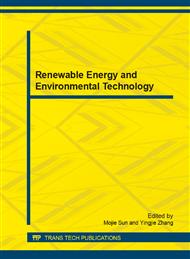[1]
Chunfang Liu, Jianguang Chen, Shan Liu. [J]. Electrotechnical Application, 2002, (5): 32.
Google Scholar
[2]
Yao Duan, Yumin Xiong, Buhan Zhang, Yan Li and Jianming Sun. Economic Reactive Power Compensation of the Railway Power Line, [C]. 2010 International Conference on Power System Technology, 2010. 1-6.
DOI: 10.1109/powercon.2010.5666091
Google Scholar
[3]
Shahzad Ahsan, Anwar Shahzad Siddiqui and Shagufta Khan. Reactive Power Compensation for Integration of Wind Power in a Distribution Network, [C]. Power Electronics (IICPE), 2012 IEEE 5th India International Conference on, 2012. 1-4.
DOI: 10.1109/iicpe.2012.6450465
Google Scholar
[4]
Wei Shi, Yanchang Zhang, Chao Zhang. [J]. Power & Energy, 2011, 32(3): 217.
Google Scholar
[5]
Xiangyu Dong. [J]. Electronic Instrumentation Customer, 2007, 14(6): 94.
Google Scholar
[6]
Yiyi Wang. [J]. Guangdong Electric Power, 2007, 20(2): 33.
Google Scholar
[7]
Manwu Kuang. [J]. Shanxi Electric Power, 2003, (117): 10.
Google Scholar
[8]
Xiaolei Cui, Na Mo, Lei Xin. [J]. Jilin Electric Power, 2011, 39(6): 12.
Google Scholar
[9]
Zhangzhuo Dong, Zhe Li, Yuanpeng Zhao. Improvement of Ant Colony Algorithm for Determine Reactive Compensation Classification Capacity, [EB/OL]. http: /www. cnki. net/kcms/detail/11. 2127. TP. 20121011. 1019. 025. html, 2013-08-03.
Google Scholar
[10]
Xiaolei Li. A New Intelligent Optimization Method-Artificial Fish School Algorithm, [D]. Zhejiang University, (2003).
Google Scholar
[11]
Fei Chen. Analysis and Research on Improved Artificial Fish Swarm Algorithm, [D]. Xidian University, (2012).
Google Scholar
[12]
Chuang Wang. The Analysis and Improvement of Artificial Fish Swarm Algorithm, [D]. Dalian Maritime University.
Google Scholar
[13]
Xideng Wang. Research of Artificial Fish Swarm Algorithm Improvement, [D]. Xian University of Architecture and Technology.
Google Scholar
[14]
Lianguo Wang. [J] Journal of Chinese Computer Systems, 2009, (8): 1663.
Google Scholar
[15]
Hongzhan Nie, Pan Lu, Yi Qiao, Xiuping Yao, Song Yao. [J]. Advanced Technology of Electrical Engineering and Energy, 2008, 27(2): 11.
Google Scholar
[16]
Hongzhan Nie, Yi Qiao, Pan Lu, Xiuping Yao. [J]. Power System Technology, 2009, 33(2): 78.
Google Scholar
[17]
H Cai, W Du, H F Wang and H F Li. Applying the Artificial Fish Swarm Algorithm for the Co-ordinated Design of PSSs in a Real Large-scale Power System, [C]. Innovative Smart Grid Technologies (ISGT Europe), 2011 2nd IEEE PES International Conference and Exhibition on, 2011. 1-7.
DOI: 10.1109/isgteurope.2011.6162754
Google Scholar
[18]
Wei Wei. Study and Application of Improved Artificial Fish Swarm Algorithm, [D]. North China Electric Power University, (2010).
Google Scholar
[19]
Zhigang Lu, Jian Liu, Jie Wu, Yanbin He. [J]. High Voltage Engineering, 2008, 34(3): 565.
Google Scholar
[20]
Xiaobo Zhou, Junmin Zhang, Xiaowei Tang, Min Xu, Yun Zhang, Zhiqiang Ye. [J]. Distribution & Utilization, 2007, 24(3): 4.
Google Scholar
[21]
Yanni Liu, Wei Wang, Lijie Xu, Lingjie Huang. [J]. Acta Energiae Solaris Sinica, 2008, 29(11): 1444.
Google Scholar


